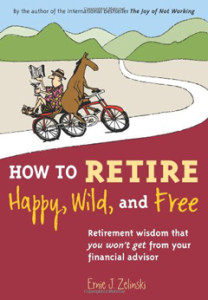
How to Retire Happy, Wild, and Free: Retirement Wisdom That You Won’t Get from Your Financial Advisor
By Ernie J. Zelinski
Zelinski encourages readers to embrace the notion that a happy, fulfilling life doesn’t require a job. In fact, your job might just be getting in the way. To illustrate his points, he includes a healthy selection of correspondence from readers who have followed his advice, ditched their 9-to-5 jobs, and found creative ways to live out their dreams.
My Take
How To Retire Happy, Wild, and Free radiates optimism and a carefree, can-do attitude, pushing the reader to consider if they’re living their retirement to the fullest. Retirement literature is brimming with financial advice and ideas about how to keep productive after leaving behind the daily rigors of the office. Zelinski has a different idea: reconsider how you define productivity and self-worth, and re-evaluate what kind of lifestyle you think is possible. Making a change for the better could simply be a matter of shifting your priorities. For instance, do you care more about leaving behind a substantial inheritance, or making sure you enjoy life to the fullest?
There is definitely some fluff here, mainly in the form of long-winded brainstorming lists of all the crazy things you could do if you didn’t have a job. But Zelinski does offer valuable content for people who are wondering what’s possible, or feeling overwhelmed by the prospect of moving ahead without any kind of employment.
Critique
Zelinski is so enthusiastic about the glory of full-time retirement that he doesn’t spend much time exploring the idea that some retirees may still want to work, or may have to work because of limited financial resources. To people who would have to live on a very small stipend if they retired, Zelinski suggests they make a few changes to enjoy life with less wealth. He does mention the possibility of part-time employment in retirement, but he spends far more time extolling the virtues of making the most of what you have.
Throughout the book, Zelinksi relies heavily on anecdotal evidence to support his retirement philosophy and doesn’t cite many specific studies (while he mentions “research,” he doesn’t always name his sources).
Conclusion
Zelinski’s writing style is jaunty and uplifting, studded with cartoon illustrations and inspirational quotes. How to Retire Happy, Wild, and Free is an empowering read for those who feel they want to live a different life, but need assurance that drastic changes can be for the better.
